|
Undoubtedly the thing which makes St. Giles in Reading such a special place is the way it has brought together Christians from such diverse wings of the Universal Church. Our ongoing lived experience of Christian Unity and interdenominational fellowship is nothing short of Spirit-breathed and is surely what the Lord had in mind when He founded His House. Although I’m now a baptised and practicing (as far as lockdown allows) Roman Catholic, I was blessed with a semi-Anglican upbringing in a Church of England school. Back then, the world wasn’t quite as secular as it is now and the C of E was still very much at the heart of English life for a lot of people. With that in mind, here are ten signs that you, too, were raised in the Church of England. (Note: Even if you weren’t, in fact, raised in the Church of England but still find yourself nodding and agreeing with some or all of these signs, you might well have been born a spiritual Anglican, only to find your true home later in life. It happens!) Here goes: 1. You love the Queen Never mind the Pope! Lizzie is your homegirl and you still stand up whenever you hear the national anthem (probably to a lot of confused looks from the younger folks around you). A monarchist through and through, republicans make you a bit nervous. Being a nice, polite person (you are, after all, British, even if only by virtue of immigration) you just about tolerate their existence, but secretly you think it might not be a bad idea to hang them at Traitor’s Gate, just to be on the safe side. You celebrate both of the Queen’s birthdays and may even have a portrait of her hanging on the wall of your home. 2. You know all of the words to ‘He’s got the whole world in His hands’ This post comes with a free earworm! Don’t say we never give you anything. You’ve lost count of the number of times you sang this song as a child, led in chorus by your extremely sweet and harmless primary school teacher (who may or may not have had a guitar). It made you feel safe and happy, as though a there were a benevolent Being (possibly with white hair and a beard) watching over you and looking after you at all times. Which, of course, there was (although I’m not sure about the white hair or the beard). 3. You were a Cub / Beaver / Scout / Rainbow / Brownie / Guide You can still remember how proud and happy you felt when you received your uniform, complete with neckerchief and woggle. You may even still be able to recite the oath you made at your investiture and whenever you make a promise you still sometimes affirm it with “Scouts’ / Guides’ honour” even though you’re now possibly approaching retirement age. You spent your winters huddled with your friends around maps in dusty, draughty church halls, and your summers on camping trips, roasting marshmallows around the fire and getting stung by wasps. Ah, those were the days! Image courtesy of Monifieth Local History Society. 4. You have taken part in a Nativity Play at least once One day when you were around four years old, you came home with the exciting news of your impending stage debut. Cue lots of messing around on your parents’ and teachers’ parts with tinsel and wire, tea towels and toy farm animals. The girl who who got the part of Mary had her fate as the Most Popular Girl in Year Two sealed – and may possibly have proudly carried this honour well into high school and beyond. On the Big Night at least one shepherd lost their tea towel, and at least one child froze with stage fright and burst into tears. But none of that really mattered because your parents still thought you were the sweetest shepherd, angel or donkey ever. 5. School assemblies gave you your moral compass The smell of school dinners lingered in the air. The words of the Lord’s Prayer were printed on large sheets of card and taped to the wall of the School Hall, which probably had a large crucifix hanging at one end. At least once per week you sat, cross-legged on the floor (until years five and six, when you graduated to the benches and felt like royalty looking down at the peasants), singing hymns and listening to life lessons taken from the Bible. Your worship was accompanied by clunky piano playing courtesy of one of your teachers and, on special occasions, by a chorus of squeaky recorders. Take a deep breath, now, and sing with me: All things bright and beautiful, all creatures great and small…! 6. You’ve been to more summer fêtes than you care to remember When the trees turned green and the air warmed up, that could only mean one thing – the summer fête was almost here. Held at your local Church Hall, no such event was complete without bunting, a jumble sale, a raffle, a tombola where lucky souls stood the chance of winning a bottle of bubble bath, a bric-a-brac stall and a bouncy castle. And it always rained, but you didn’t let this keep you or anyone else off that bouncy castle. Cream teas (with homemade scones) were not optional. All proceeds went toward fixing the Church roof. 7. You have read all of the Chronicles of Narnia by C. S. Lewis …or at the very least, The Lion, the Witch and the Wardrobe. This may have been accompanied by discussions with your friends over whether you were Peter, Susan, Edmund or Lucy (hint: we’re all Edmund). Naturally, any adult female authority figure you didn’t like ended up being cast in the role of the White Witch in your mind. Aslan’s death scene was genuinely upsetting and unsettling, a feeling which his resurrection never quite took away. At least once, you found yourself climbing into a wardrobe on a rainy day and reaching through the coats, just to see what might happen. But you didn’t shut the door behind you, knowing, as you did, that it is a very foolish thing to shut oneself into a wardrobe. 8. Early autumn equals ‘Harvest Festival’ Every August/September your mum leapt at the opportunity to clear out all of the tinned stuff from the cupboard which she knew you were never going to use. Cue two or three long tables in the School Hall, covered with every kind of dried food you can imagine, as well as a whole lot of baked beans and Heinz soup. To this day you’re not exactly sure where it all went. 9. You got crafty You have, at some point, made some or all of the above items. You mightn't have been the brightest child in your year, but you sure as heck know what to do with an empty toilet roll, a pot of PVA glue, cotton wool, glitter, felt and some lollipop sticks. The only limit is your imagination! 10. You feel like Jesus has been your friend from a very young age It might not have always been plain sailing and there have probably been more than a few bumps in the road, but you genuinely feel like the Lord has always been a part of your life – even if you’ve spent a good portion of that life turned away from Him. You grew up knowing that there was a very special Friend who would always be there for you no matter what. As your capacity for understanding has grown, so, too, has your love for the One who loved you first. You feel blessed and grateful to have heard the Good News as a child, even if it took you a long time to fully embrace it. Because of your upbringing, you’ve been blessed with the knowledge that the Truth has a Name, and that the Truth sets everyone free. Alleluia! Artist unknown.
Well, that’s it! How many of these did you find yourself nodding and smiling at? Or are there any I’ve missed? What are your memories of growing up Anglican? If you’re a convert, what drew you to the C of E? Please feel free to share your thoughts and experiences in the comments. by Lucy Stothard One of my favourite stories about St. Thérèse of Lisieux goes like this: one day the Little Flower was happily munching on a cream cake. She was then confronted by a fellow nun, who admonished her for doing something so frivolous and indulgent: “if you were a saint, you wouldn’t be enjoying that!” (Apparently food shaming was a thing in the 19th century as well. Who knew?)
Thérèse, however, refused to be chagrined. “I am offering it up to God!” she cried, before continuing to eat her cake. You go, girl. Thérèse’s theology wasn’t quite as far out as one might think. As Catholics, ‘offer it up to God’ has become an almost canned answer we give to anyone who is experiencing pain or difficulties in this life. If we’re not careful, we end up not only minimising what the person is going through but also creating the false impression that God is pleased by it, which is absolutely not the case. God is good and delights in all that is good, true and beautiful. Therefore, only good things should be offered up to Him. He’s no happier with our stomach bug, sciatica, financial troubles or disappointments than we are. What we offer up, then, is not the unpleasant event or feeling but our willingness to endure it, as Christ endured His cross, for the redemption of souls. Doing so is an act of selfless love, and this is something God can delight in. If only good things should be offered up to God, then, is it so far-fetched to believe that one can offer up the childlike joy and delight that comes with eating a cream cake? Even under the Old Covenant, there was a precedent for eating some of the animals that were sacrificed to God (have a look at Leviticus 6 if you can stomach it). The Hebrew word for sacrifice is korban, which has its roots in le-karev – to come close. The ritual of sacrificing an animal and eating it in God’s presence was about coming into Communion with God – a ritual we now repeat every time we offer and eat our Paschal Lamb, Christ. By doing so, we share a meal with our Creator, an image in Scripture which is used to denote the intimate fellowship He desires to have with us (see Revelation 3: 20). Understanding this, there may be no limits concerning what we can offer up to God, whether it’s the smell of freshly-baked bread, the feeling of grass under our bare feet in summer, the love we share and the fun we have with our spouse, relatives or friends. God loves His children and wants us to be happy, but He’s not content to stand back and watch from a distance. Jesus sent the Holy Spirit precisely so that we could experience the joy of a life shared with Him and that He could experience the joy of a life shared with us. He wants to walk in nature with you and take delight in the look on your face as you stop to admire the flowers and trees. He wants to laugh with you, play games with you, make dinner with you, read books and watch movies (clean ones! 😉 ) with you. He wants to splash in puddles with you and listen to the rain falling on the roof, watch over you at night and sing over you as you wake up in the morning. All of life's good gifts, then, provide us with the opportunity to have Communion with God. I like to think that Jesus of Nazareth was a man who knew and understood this. Close your eyes, if you will, and ask the Holy Spirit to take you to the Wedding at Cana. What do you see? Is Jesus sitting, sour-faced and disapproving, in a corner as He waits for the wine to run out? No. Jesus hasn’t even noticed, because He’s far too busy dancing, singing and having fun with His family and friends. Providing wine is the responsibility of the Bridegroom. It’s not Jesus’ wedding yet and therefore not His problem. Yet provide the wine He does, and it’s the best they’ve ever tasted. Our God is not stingy. He does all things well. Like Thérèse, Jesus was criticised by those who didn’t yet understand that sanctity lies not in rejecting God’s good gifts, but merely in the correct ordering of them (Matthew 11: 19). With that in mind, perhaps the most spiritual thing any of us can do this afternoon is eat some cake. by Lucy Stothard Source: https://www.myjewishlearning.com/article/when-eating-meat-was-a-sacrifice/ Image: Pompeo Batoni, Ecstasy of St. Catherine of Siena
Today we celebrate the feast of St. Catherine of Siena, patroness of Europe, and this morning we were especially graced with a thought-provoking reflection from Father Tomas, complemented by another beautiful watercolour from Jan Hearn. Although this awe-inspiring woman walked the earth almost seven hundred years ago, she nevertheless has a great deal of wisdom to offer to our modern world. True wisdom is, after all, timeless and relevant to every generation. With that in mind, here are five quotes attributed to St. Catherine for you to ponder and reflect upon this week. 1. "Be who God meant you to be and you will set the world on fire." The letter to the Hebrews tells us that Christ has already perfected those who are set apart unto God (Hebrews 10: 14); St. Paul affirms this in his letter to the Philippians (Philippians 3: 15). However, Paul also tells us to ‘forget the past and strain ahead for what is still to come’ (Philippians 3: 13), while making numerous references to spiritual infancy and maturation. Life in Christ, then, can be read as a process of growing into our true identity which has been bought for us by the shedding of Christ’s blood. If we do, promises St. Catherine, we will cast the fire on the earth that was the Lord’s earnest wish. 2. "You are rewarded not according to your work or your time but according to the measure of your love." One positive to come out of the coronavirus pandemic is the way it has caused us to re-evaluate how we regard people’s work. As a former trade unionist I don’t believe in unskilled labour; nevertheless, we live in a society which values prestige and financial reward, and it can be tempting to find our identity in what we do rather than how we do it. St. Catherine reminds us that God is no respecter of persons and that regardless of how we earn our living, it is the amount of love we have for Him and others which will ultimately determine our heavenly reward. 3. "Preach the Truth as if you had a million voices. It is silence that kills the world." A look at St. Catherine’s wimple and veil might lead one to conclude that she must have been a nun, but this is not the case. Catherine did, at one point, discern the cloistered life, but God revealed to her that He wanted her to be out in the world, working for His Kingdom as a holy laywoman. It was then that she joined the third order of St. Dominic. The Dominicans – also known as the Order of Preachers – are committed to speaking the truth, whatever the personal cost. In an age of subjectivism where truth is generally accepted to be a matter of personal preference rather than absolutes, these words could not be more relevant. Silence provides the fertile soil from which injustice, oppression and the destruction of human life spring. Speaking the truth is not optional – it’s a moral responsibility. 4. "What is it you want to change? Your hair, your face, your body? Why? For God is in love with all those things and he might weep when they are gone." Human beings are God’s highest creation, destined from the beginning to be suitable vessels in which He can dwell in all His fullness (2 Timothy 2: 21; Ephesians 3: 19). The enemy, however, does not want us to know this truth and will go to great lengths to prevent us from discovering it. I used to work with several young women who were naturally beautiful and yet couldn’t see it – all of them were dissatisfied with their appearance and most were considering having cosmetic surgery. This wasn’t their fault – they’d grown up believing that they had to match an impossible standard in order to be worthy of love. Yet St. Catherine would have us remember that with God, nothing is accidental and He is quite delighted with each and every one of us: ‘How beautiful you are, my love, how beautiful you are!’ (Song of Songs 4: 1) 5. "He will provide the way and the means, such as you could never have imagined. Leave it all to Him, let go of yourself, lose yourself on the Cross, and you will find yourself entirely." God has a beautiful and unique plan for every human life, but it’s possible to lose a lot of sleep and peace if we try to realise that under our own steam. It can be an immense source of relief when we realise that God’s will for our lives isn’t something we have to try and make happen, framed within a narrative of success, failure and the following of dreams. Rather, it’s something to which we abandon ourselves, no longer striving to maximise pleasure and avoid suffering but wholeheartedly embracing our Cross. It’s something which will naturally unfold as we realise that the story is not about me but about Him who loved us. Paradoxically, it’s in this surrender and dying to self that we actualise the person God always intended us to be... …which I think brings this post more or less full circle. St. Catherine of Siena, pray for us! by Lucy Stothard In 1970, Pope St. Paul VI declared St. Catherine of Siena to be a Doctor of the Church and gave her the unique title Doctor of Wisdom. Her teaching is a total life experience that unifies belief, conviction, devotion and service within her profound mystical experience of God. Her spirituality is truly unique, bringing together intellectual and existential truth in her whole being.
St. Catherine of Siena was born in 1347 in Italy. She became a third order Dominican, learned to read and write, and was known for her service to the poor and her involvement in politics. She worked for the unity of the Church and was loyal to the pope. She died in 1380 at the age of thirty-three. Her best known spiritual writing is The Dialogue. Her quotes, though over six hundred years old, are still relevant today and can be an inspiration for our prayer life. One of St. Catherine's principal teachings is self-knowledge, i.e., knowledge of oneself and knowledge of God. She adapted the Christian spiritual tradition on the subject and presented it anew using a number of ingenious images such as a well, a cell within a cell, a peaceful sea, a mirror. So important was self-knowledge in her life and teaching that she came to regard it as virtually prayer itself. In contemplating God's love and beauty, she sees God's image and likeness in ourselves; we discover God's presence in ourselves and our presence in him "as the fish is in the sea, and the sea is in the fish." In Christ we see the virtues and then discover them also within ourselves and realize that they are meant to increase. We also see that we have no existence apart from God; everything that we have is his gift to us. As we contemplate God's love for us, we return love for love. We crave union with God, the ground of our being and supreme Beauty, and come to see that he too desires to be in a personal love-union with us in which he will share more fully his being and joy with us. As selfish self-love falls away, we grow towards union with God. “My me is God, nor do I know my selfhood save in Him. My Being is God, not by simple participation, but by true transformation of my Being.” Let us pray. God of Wisdom you made our sister Catherine burn with Divine love in contemplating the Lord's passion and in serving your Church. With the help of her prayers may your people, united in the mystery of Christ, rejoice forever in the revelation of his glory, who lives and reigns with you and the Holy Spirit, God, for ever and ever. Amen. By Fr Tomas Illustration © Jan Hearn 2020 Image In the Shadow of His Wings by Lucy Stothard
I always have to suppress a smile whenever I see an image of Our Lady which depicts her as blonde-haired, blue-eyed, rosy-cheeked and white. True, it’s possible that that’s what she looked like, but as a first century Middle-eastern Jew, I think it’s pretty unlikely. Rather like Our Lord, Mary has been frequently depicted in art throughout the centuries, and generally in ways which were heavily influenced by the beauty standards of the artist’s society. When I sat down to draw this morning, I wasn’t really sure what I wanted to convey, only that I hadn’t really been satisfied with my last attempt at drawing Mary and wanted to give it another go. I asked the Holy Spirit to guide my hand, and the above drawing was the end result. This post is the result of my meditations on the drawing and what insights it can give us into the life of Our Lady and the heart of God. There are many reasons to love Our Lady, but part of what makes her most appealing in my eyes is that, in many ways, she epitomised everything which is despised in the modern West. Mary was poor, presumably uneducated, Middle-eastern and from an inconsequential backwater of someone else’s empire, non-Anglophone and a teenage mother to boot. Yet she is the one whom God chose to crown as Queen of Heaven and Empress of the Universe, Mother of God and of the whole, redeemed human race. It was this Truth that led Saint Elizabeth, filled with the Holy Spirit, to cry out: “blessed are you among women, and blessed is the fruit of your womb!” One can’t help but wonder, though, whether Mary’s neighbours and relatives were similarly impressed when she fell pregnant out of earthly wedlock. In a place like Nazareth, people talk – and more often than not, the information they exchange isn’t completely fair or accurate. It’s more than likely that Our Lady would have had to endure gossiping, sniggering, haughty looks and conversations suddenly stopping whenever she walked into a room. The rumours probably persisted well into Jesus’ adulthood; they are alluded to in the words of the Jewish authorities as they confront Jesus with what reads like an underhand snipe: “We are not illegitimate children!” (John 8: 41) Are we guiltless in all of this? It’s human nature to make judgements about a person based on whatever superficial information we have about them, be it how they dress or look, their personal living situation, the things they say, or even what we’ve heard, third-hand, from others. What we have to remember is that this information is, by its very nature, limited and incapable of giving us a complete picture of a person or their story. Jesus admonishes us not to judge, and not merely because we all too often fail to meet the standards we’re holding others against. To make a fair and accurate judgement, one must have all the facts – and we usually don’t. This is why it’s so crucial for the church to remain open and non-judgemental toward the souls she encounters. As Our Lady’s story shows, appearances can be very deceiving and we must be constantly mindful of the fact that only God knows the truth about a person and their individual journey. Only God has all the facts. If single parents, divorcees, prostitutes, those with addictions, LGBT people, immigrants and the homeless don’t feel that they can walk into a church and be overwhelmed by the healing love of God, then that church is in poverty. God knows the truth about all of us. He knew the truth about Mary, too. I like to believe that, even amidst the disapproving looks and the pain of being misunderstood or disbelieved, she was able to hold her head high, knowing that she had found favour with the Most High – and that that was all that really mattered. If you’ve ever had the experience of being pre-judged, misunderstood, gossiped about or believed to be something you weren’t (and most of us have!), then this is something for you to hold and meditate on this week. Just as He saw Mary, God sees you – in all your complexity as a human being. He understands. He knows who you really are and is delighted. And if you’re on this website and reading this blog post, the likelihood is that you, too, have found favour in His eyes. Blessed are you among men and women! by Lucy Stothard Image: Jan at work, courtesy of Paul Hearn.
Over the Easter Season you may have seen a number of posts on the blog with illustrations from our resident artist, Jan Hearn. Now Jan has shared, in her own words, the creative and spiritual journey she has been on with the Lord during what is probably the strangest Easter season any of us have ever experienced. You can read part one of Jan's story here: Part 1. And you can read part two here: Part 2. by Lucy Stothard Today’s first reading brings us many weeks ahead, to Pentecost (will we be allowed to celebrate it together?).
We meet Peter in the midst of the Temple addressing the congregation and explaining to them the phenomenon of Pentecost. He explains that what happened in Jerusalem was nothing else than the fulfillment of the Scriptures. The Acts of the Apostles have been written by St. Luke, the author of the Gospel for today and we can see a theme that unifies both readings – an explanation that the events of the Passion, the Crucifixion and the Resurrection of Our Lord are not events isolated in history, but events foretold in the Old Testament that are a part – and the centre – of the plan for the salvation of our Creator. Peter starts with Psalm 16; when David, the supposed author of the psalm, said “you will not abandon your holy one to see corruption” he could not have been speaking about himself, since his body must have corrupted. Peter concludes that David must have been speaking about the Messiah. The significance of today’s second reading is so great that it found its expression in the following article of the Catechism: CCC 622 “The redemption won by Christ consists in this, that he came ‘to give his life as a ransom for many’ (Mt 20:28), that is, he ‘loved [his own] to the end’ (Jn 13:1), so that they might be ‘ransomed from the futile ways inherited from [their] fathers’ (1 Pt 1:18). We find here the mention of the death of Our Lord as ‘ransom’. Ransom is a difficult word; in particular in the Middle Ages, when being kidnapped and redeemed by the payment of a ransom sum of money was a contemporary reality, theologians were wondering to whom was the ‘ransom’ mentioned in today’s second reading paid. The "theory of ransom" was developed in particular by Origen in the 3rdcentury. In his understanding, Adam and Eve became captives to Satan and sin at the fall, followed by all of their offspring – the entire world. In order to bring salvation to the human race, Jesus had to die to give Satan his due price of blood, buying back humanity. However, Jesus did not remain dead, in the clutches of Satan, but rose back to life, defeating Satan and the death he brings to the world. Ransom theory was widespread until the 11thcentury, when Anselm of Canterbury argued against it strongly. Origen was one of the great theologians, but here, he missed the mark. The Catholic Encyclopaedia states: “This curious notion, apparently first mooted by St. Irenæus, was taken up by Origen in the next century, and for about a thousand years it played a conspicuous part in the history of theology... A protest was raised by St. Gregory of Nazianzus in the fourth century, as might be expected from that most accurate of the patristic theologians. But it was not till St. Anselm and Abelard had met it with unanswerable arguments that its power was finally broken.” The Catholic teaching today does not accept ransom theory in its original form. In the Catholic understanding, the death of Jesus on the Cross is primarily an act of love which defeats our slavery to sin and unites us with God in salvation. On the other hand, for the majority of Protestant theologians, the Cross is primarily an event in which our punishments are taken up by Christ. The death of Our Lord should therefore not be understood as a ransom paid to Satan (or God or anyone else), for “out of love for this Father and for men, whom the Father wants to save, Jesus freely accepted his Passion and death. … Hence the sovereign freedom of God’s Son as he went out to his death.” (CCC 609). Pope Benedict explains in his Introduction to Christianity the reconciliation of the Cross as something God does for us in Christ, and not something done to restore the divine order, much less God’s honour. For him, the cross reveals our weakness but it also it tells us to glory in our weakness because God Himself has shared in it, descending from His Heavenly throne to live amongst us and die with us – but not out of an absolute necessity, but as a Revelation to the Church and as a testimony to the true nature of His love, which is self-sacrificial. Therefore, it is in order that the true nature of love, humility and obedience could be revealed that required hat Calvary be a sacrifice which was “the expression of that foolish love of God’s that gives itself away to the point of humiliation”. God's merciful love is the cause, not the result of what happened at Calvary. By Fr Tomas Illustration © Jan Hearn 2020 “It’s different for you,” insisted my friend. “You’re someone who is planning on making a career out of your faith.”
It was early February and the two of us were sitting in our favourite café in Barcelona’s Gothic Quarter, a place where we’d shared many a café con leche and were currently having brunch. The discussion had turned to the Church’s teachings on marriage, divorce and human sexuality. To my friend, who is neither a Christian nor a Catholic, these doctrines seemed old-fashioned at best and medieval and oppressive at worst. Her comments came as a response to my attempts to explain that a romantic relationship does not represent the pinnacle of human happiness – union with God does. She wasn’t buying it. I didn’t have the heart to point out that a vocation to religious life or the priesthood is not a career and shouldn’t be perceived as such. What I did try to emphasise was that no, it’s not different for me. The call to make God one’s ultimate source of joy, peace and security is not something which is reserved for those who’ve heard and answered the call to a life of celibate chastity. Rather, it’s the invitation which the Lord extends to all humans and the inheritance of all Christians. When I first started attending Catholic Mass back in late 2016, I was surprised to learn how few of my new brothers and sisters seemed to have realised this wonderful truth. At the weekly post-Mass gathering for coffee there was an awful lot of talk about a great many things – book clubs, upcoming holidays, work, the politics of the parish – but not much of Christ Himself. And I really, really wanted to talk about Jesus. But when I did, people would look at me as though I was naïve or a bit strange. I found it all rather confusing. What’s wrong with book clubs, holidays and careers? Nothing! These are good gifts from God. So too is a holy marriage, a baby, a university education, a beautiful home, a well-kept garden. But we invariably run into problems when we pursue these things over and above union with the One who longs to be the Beloved of our souls. The first commandment tells us that our God is a jealous God, while St. James points out that the Holy Spirit ‘wants us for Himself alone’ (James 4: 5). ‘I only wish you were able to tolerate a little foolishness from me’, writes St. Paul in his second epistle to the Corinthians. ‘But of course: you are tolerant towards me. You see, the jealousy that I feel for you is God’s own jealousy: I arranged for you to marry Christ so that I might give you away as a chaste virgin to this one husband. But the serpent, with his cunning, seduced Eve, and I am afraid that in the same way your ideas may get corrupted and turned away from simple devotion to Christ’ (2 Corinthians 11: 1-2). Our world appears to be suffering from an anxiety epidemic, with anxiety disorders being among the most commonly reported mental health complaints. It’s no wonder. Almost half of marriages now end in divorce. The job market is becoming increasingly competitive; easy access to higher education means that a Bachelor’s degree no longer distinguishes a person. It’s not uncommon to see people with Master’s degrees serving lattes and cleaning toilets (I know. I was one of them not long ago). House prices have spiralled to the point that most young people don’t stand a chance of being able to buy their own home – and those that manage invariably end up saddled with hefty mortgages. And just when we thought austerity was behind us, along came the novel coronavirus, obliterating the world economy and prematurely ending thousands of lives. Surely this is what Jesus was talking about when He cautioned His listeners against building their houses on sand. When we allow our peace and joy to rest on the shifting sands of life, it’s all too easy for our house to come crashing down when the storm hits. Rather, like the wise man, we need to learn to build upon the rock. “Peace I leave you,” said Jesus to His disciples in the parting discourse, “My peace I give to you. I do not give to you as the world gives. Do not let your hearts be troubled and do not be afraid” (John 14: 27; emphasis mine). The word Jesus used was ‘Shalom’. This ancient Hebrew word is most commonly translated as ‘peace’, but in reality it means so much more than that. Shalom is not something which can be bought. It is wholeness, satisfaction, security, rest: the deep, unshakeable peace and tranquillity which comes from placing God at the centre of one’s life and surrendering totally to Him. It’s a peace that rests, as we are encouraged to do at Compline, on the ‘eternal changelessness’ of God, rather than on anything external or temporal. Shalom, then, can only be found and maintained by daring to fall deeply in love with the God of Israel. The second we start wanting anything more than the God whom, by His Spirit, we already possess fully, we lose it. This is the secret, and its one which all of the saints understood well. In fact, I would argue that it’s impossible to become a saint without it. It was the knowledge of this secret that inspired St. Paul to write: ‘For I am convinced that neither death nor life, neither angels nor demons, neither the present nor the future, nor any powers, neither height nor depth, nor anything else in all creation, will be able to separate us from the love of God that is in Christ Jesus our Lord’ (Romans 8: 38-39). Let’s conclude with some well-known words from Saint Teresa of Avíla: ‘Let nothing disturb you, Let nothing frighten you, All things are passing away: God never changes. Patience obtains all things. Whoever has God lacks nothing; God alone suffices.’ Amen. by Lucy Stothard There’s been a lot of talk on social media lately of simply cancelling 2020 altogether, and it’s not hard to see that those who post such comments are only half joking. Whether we’re people of faith or not, most of us started the year with plenty of plans and ideas about how it would look. There were places we wanted to go, things we wanted to achieve, people we wanted to see. When the New Year rang in with the usual fireworks, kisses and good wishes toward our families and friends, Coronavirus was still a distant problem in a country most of us would never visit. How little we knew.
Now there’s a palpable sense of life being ‘on hold’. Weddings, birthday parties and well-loved yearly public events have been cancelled. A whole generation of young people won’t get to properly enjoy graduating from high school or university. People who’ve poured life savings into businesses are in the heart-breaking position of watching their livelihoods waste away. Calling these first world problems isn’t helpful because it invalidates the very real sadness, worry, frustration and disappointment that is currently being experienced by so many. If you’re sitting at home, reading this blog post, you might well have an idea of where you were supposed to be on this particular day. For me, this should have been my first week as an aspirant at Stanbrook Abbey. But perhaps we need to change the way we look at this. After all, God saw all of this coming and factored it into His plans for our world before the beginning of time. It would be quite accurate to say that we’re not ‘supposed’ to be anywhere other than exactly where we are – even if that place is a painful and difficult one. Today’s saint knew a thing or two about life not turning out the way we might want or expect. Known as ‘the Passion Flower’ or ‘the Flower of Lucca’, Gemma Galgani was born in 1878 to a traditional and very devout Catholic family in the Italian village of Camigliano. Gemma lost her mother at the age of seven. When she was sixteen her brother Gino, to whom she was especially close, also died following a long sickness. Other members of the household, including Gemma herself, also suffered sickness during this time, which left the family financially exhausted. Gemma’s father was forced to sell both his holiday home and the family home. Three years later he, too, would die at the age of fifty-seven. Gemma showed extraordinary piety from a very early age; as a teenager she was reproved by her family for the intensity of her religious practices. They tried to persuade her to stop going to church both morning and evening and to live a more ‘ordinary’ life, to dress more fashionably and to go out more. Gemma, however, was inflamed with love for Christ and wanted nothing besides Him. She had an immense love for the poor and would frequently give away any money, clothes or food she had, being quite happy to leave herself with nothing more than a single dress to wear. After her father’s death, the remaining Galgani children were left destitute, with bailiffs coming to the house and taking every penny they had, even making the children empty their pockets. However, Gemma never lost her confidence in God’s provision: "Say the Rosary of five decades with these words: 'Providence of God, have mercy on me.' When you have said that ten times, add: 'Providence of God, You have provided for me,' or, 'Providence of God, You will provide.' " God did provide, and Gemma was sent to live with her aunt and uncle. She was by all accounts a remarkably beautiful young woman and two men proposed marriage to her. Gemma refused them both, desiring a life of silence, solitude and prayer – whatever the cost. It was around this time that Gemma became seriously ill with meningitis, a sickness which caused her to suffer blinding headaches and back pain. At the same time her spine became curved, she lost her sense of hearing and her hair fell out. She suffered from spinal abscesses which had to be repeatedly lanced and injected with medicated glycerine – an extraordinarily painful procedure during which she didn’t utter a single word of complaint. She spent her days and nights lying in the same position, unable to move unless somebody helped her. Gemma was miraculously cured after making a novena to St. Margaret Mary Alacoque, who made popular devotion to the Sacred Heart of Jesus. She was graced with a vision of Christ, which she described as follows: He said to me: "Gemma, do you wish to be cured ?" I was so overcome with emotion that I could not speak. . . . Poor Jesus! The grace was granted; I was cured. . . . That morning I wept with Jesus, and Jesus, always good, always tender, was saying: "I shall always be with you, my daughter. I am thy father," and, pointing to Mary the Mother of Sorrows, " she will be your mother. A father's help will never be wanting to whoever puts himself in My hands. Although I have taken away from you every support and consolation on earth, nothing will ever be wanting to you." In spite of this, Gemma’s overall health remained poor. She wished to become a Passionist nun, but was rejected on these grounds. She offered the disappointment up to God. At the age of twenty-one she received warning, in prayer, that an unusual grace was about to be granted to her. She then experienced pain and blood coming from her hands, feet and heart – the wounds of Christ, or stigmata. Every Thursday evening she would fall into rapture and the wounds would appear. In early 1903, Gemma was diagnosed with tuberculosis. She suffered greatly until her death on Easter Saturday of the same year. Her parish priest later testified that she had died with a smile on her lips. I wanted to write about St. Gemma today because her life shows that the Christian truly has nothing to fear in either, sickness, death or poverty. A life that appears tragic by worldly standards can actually be one of incredible sanctity and even joy when the soul desires God above all things and is able to trust in Him. As we wait for lockdown to end and wonder what life will look like on the other side of the pandemic, Gemma’s story can, I believe, provide us with reasons to hope. Ultimately, our security rests not in our jobs, health or finances but in the changelessness of God. Gemma was canonised in 1933 and is the patron saint against temptations (especially those against holy purity), against the death of parents, against tuberculosis, of students and of pharmacists. I’m sure she would be happy to walk with us through these days of trial and uncertainty. St. Gemma Galgani, pray for us! by Lucy Stothard |
Lucy Stothard & Fr David & Fr TomasLucy is an Intern at S Giles, Fr Tomas is is our curate, and Fr David is the vicar. We hope to offer some regular words of encouragement during this difficult time. Archives
May 2020
Categories |

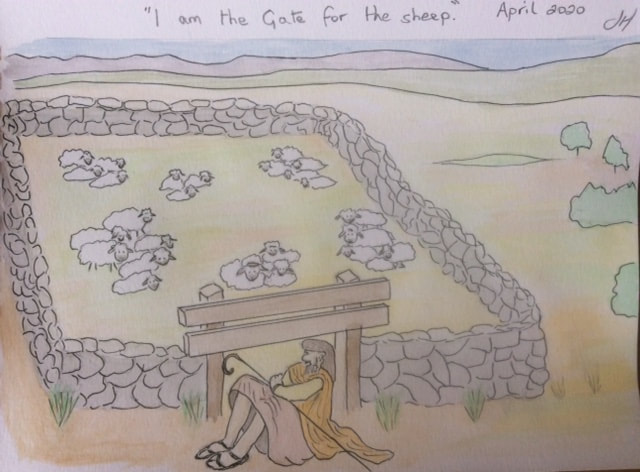
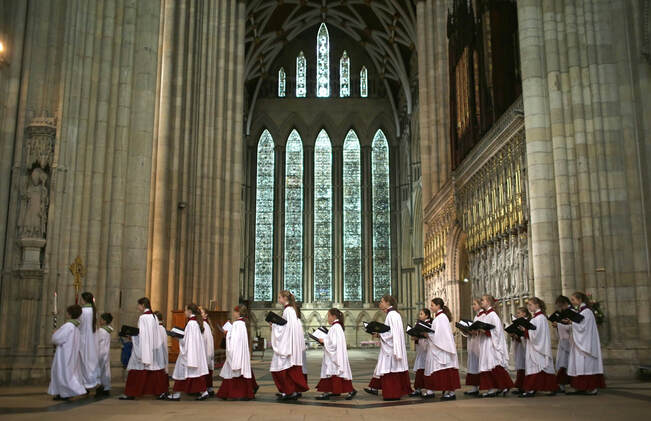


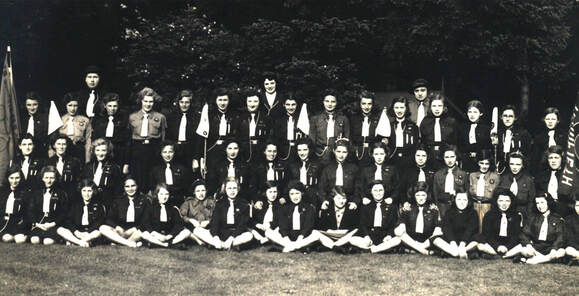
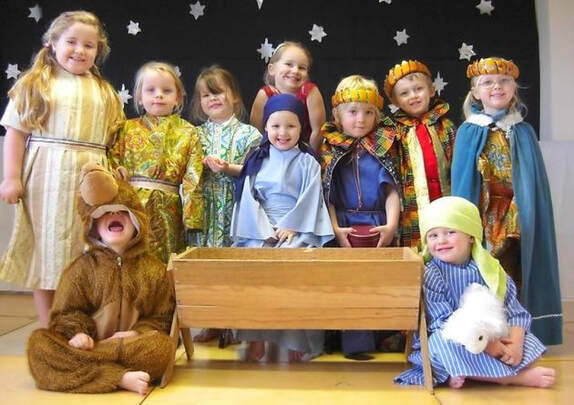

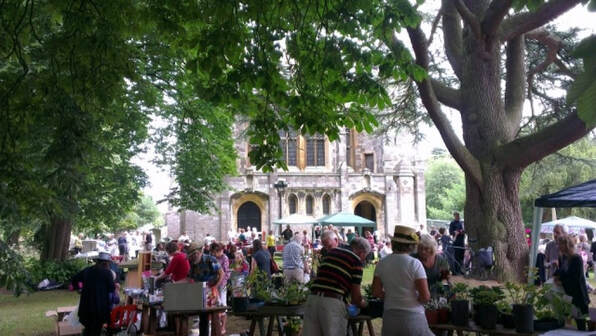

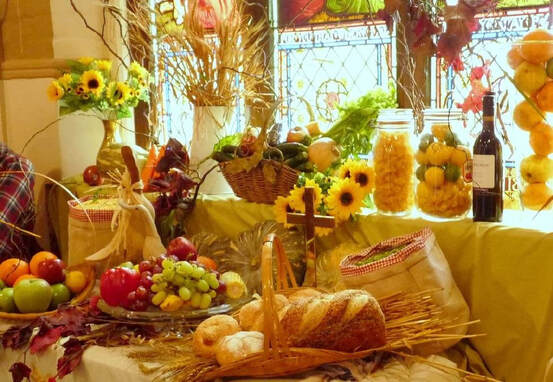
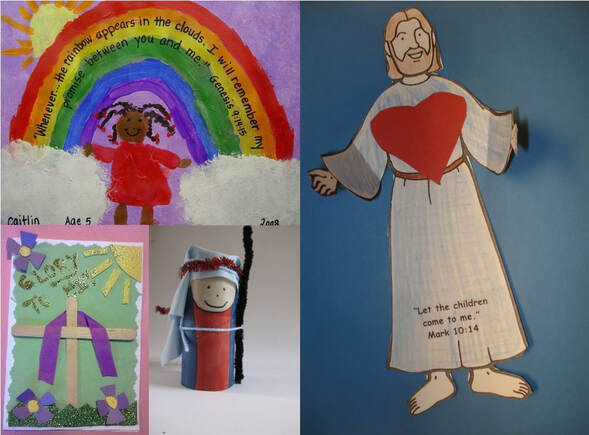


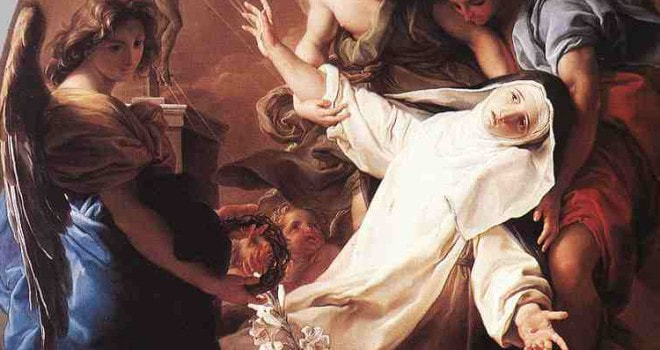
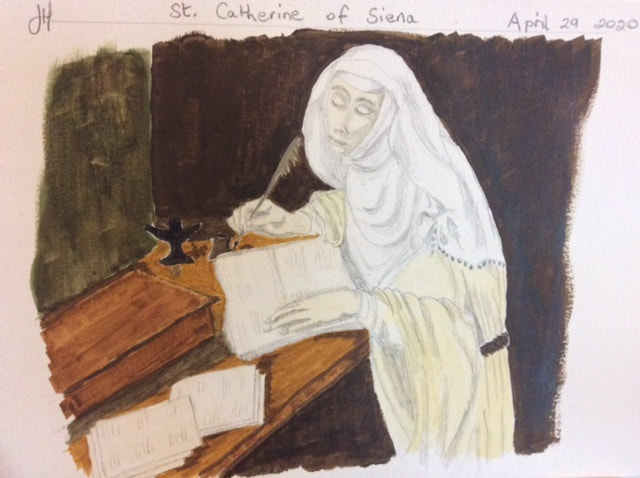


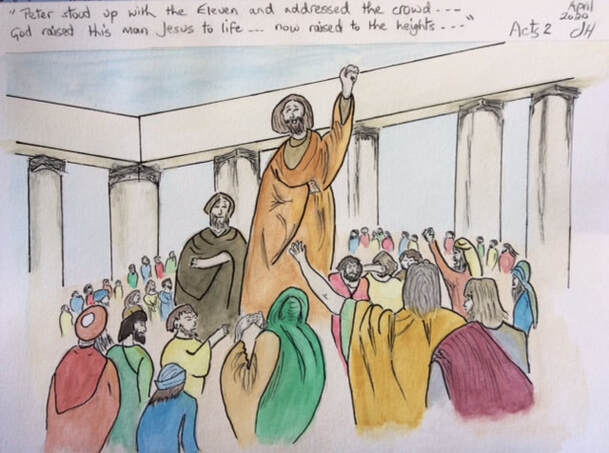

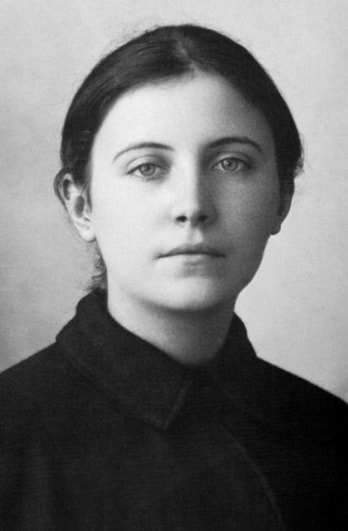
 RSS Feed
RSS Feed
